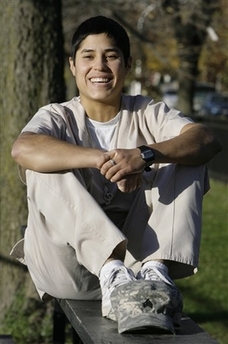Women face emotional war trauma
(AP)Updated: 2006-12-04 14:09
CHICAGO - The nightmares didn't start until months after Alicia Flores returned home. The images were stark and disturbing: In one dream, a dying Iraqi man desperately grabbed her arm. In another, she was lost in a blinding sandstorm.
Sometimes, Flores awakened to discover her mouth was dust-dry - as if she were really stumbling through the scorching, 120-degree desert.
The nightmares bring Flores back to Iraq, and her service in the Army's 92nd Chemical Company. She was just 19 when her unit arrived there. Now 23, she's left with memories of women and children being killed, of hauling bodies, of shooting a teenage Iraqi fighter. ("It was him or me," she says.)
"I'm fine with what I did over there ...," Flores says. "In my eyes, I did a good thing. It really doesn't bother me. The only thing that bothers me is I just want to sleep more."
Flores is one of a new generation of women who have returned from war to cope with emotional stress or physical wounds that linger long after the sounds of mortar and gunfire have faded. Studies of Vietnam and Gulf War veterans have documented post-traumatic stress in females - with higher rates than men, in some cases.
But the war in Iraq and Afghanistan has seen a far larger deployment of women - more than 155,000 - with far more females exposed to ambushes, roadside bombs, rocket-propelled grenades and other deadly hazards. And they have been left with an increased risk of combat-like stress.
Flores says she's not alarmed by her diagnosis of post-traumatic stress; she's getting help for her sleeping problems. It wasn't the war, but the adjustment to the civilian world that she found difficult.
"It was OK - now what?" she says. "You have nobody to talk to. Your family can't relate to what you and your soldiers had and it's just really hard. ... I felt lost. ... I didn't know what to do with my time."
That anxiety - along with depression, irritability and feelings of isolation - also are common symptoms for men with post-traumatic stress, but some mental health experts believe there are distinct pressures for women veterans.
Some come from military service itself - where some women feel they need to prove themselves - while others come from the transition from vigilant soldier to caring wife or mother.
"Women are pulled in different directions," says Darrah Westrup, lead psychologist at the Veteran Affairs' Women's Trauma Recovery Program in Menlo Park, Calif. "They want to be a good partner. They want to be a good mother. ... They want to be a good solider."
Returning home can be especially stressful for women who may find themselves running a household, taking care of children, going to work and dealing with insomnia or other war-related problems, says Diane Shearod, women veterans program manager at the Hines VA Hospital in Chicago.
"They get frustrated with themselves not being able to manage like they did before," she says. "They have to run the kids to school. They have to take them to different functions. Can you imagine what that's like with just two to three hours sleep? You're wondering, 'Am I going to be like this forever?'"
Though it's too soon to gauge the toll on women veterans, some early studies have offered a few clues.
For example, the VA reports that slightly more than a third of 23,635 women veterans from Iraq and Afghanistan evaluated from 2002 to last August had a preliminary diagnosis of a mental disorder.
| 1 | 2 | 3 |  |
|
||
|
||
|
|

